We take great care in pairing the right words with the right images here at 37signals. Jason Fried writes and rewrites headlines and body copy over and over again to ensure that we’re communicating the right message.
I have a theory about online advertising. I’m not sure if I’m on to something, but I wanted to share it with you to hear what you think. Here goes:
The Subliminal Negativity Theory
News is depressing. There are crises, wars, bailouts, failures. These news sources need advertising to keep reporting the news. It has been that way for ages. The revolution of advertising online (as demonstrated by Google) has been to serve relevant and contextual ads. These ads are related to the content we’re interested in.
However, many of the ads on news sites are displayed inline with negative and scary headlines. Do people viewing these ads pick-up on the negative mojo? Do the advertisers get some negativity rubbed off on them? Like I said, at 37signals we take great care in pairing words and images on the screen. We would never want to associate our products with negative words.
My theory is that the advertisers on these news sites do pick up on some of the negativity in the headlines. There’s got to be some subliminal association at work. Here are some screens from various news sites around the web.
The New York Times
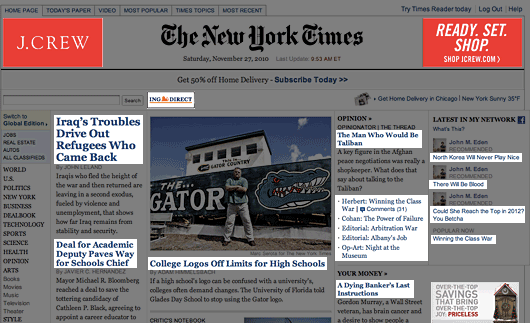
The Wall Street Journal
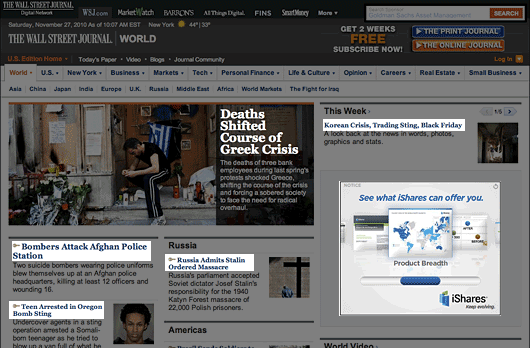
CNN
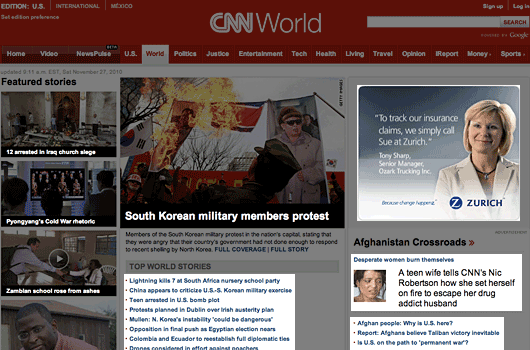
BBC
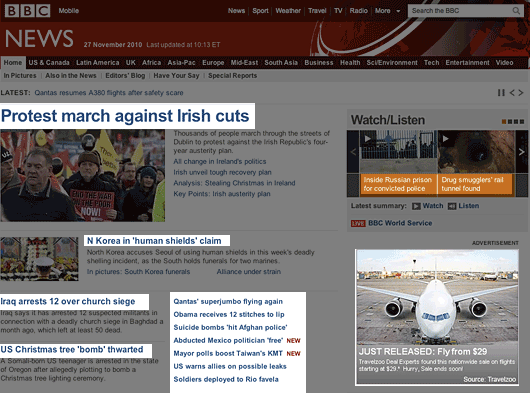
Fox News
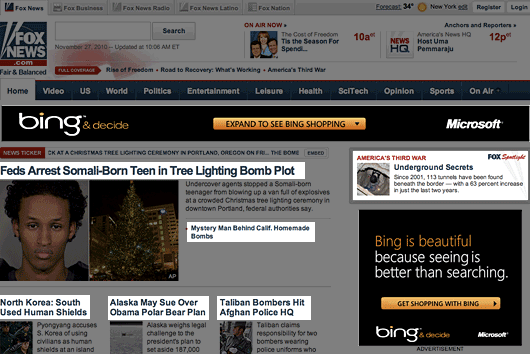
So what do you think? I’d love to hear thoughts or contrary theories in the comments.

David
on 27 Nov 10My take is that the majority of mankind wants to see something burn or somebody fail. Not many people really want to read about acts of kindness or the needy being cared for. (Most people won’t admit that, but it’s true.) It makes them feel bad about being a turd.
That said, advertisers just want eyeballs so whatever needs to be done to attract those eyeballs is what will be implemented. Principles be damned.
It’s screwed up, but that’s where we are at.
Cynical Grinch
on 27 Nov 10Well the page-scraping technology is there so the opportunity is certainly available for for companies such as insurance companies to latch onto the negativity of the news in such a way that it works in their favour.
Ken Beegle
on 27 Nov 10In most the examples, the advertisements are presenting happy, positive images and words. J. Crew is presenting an action that’s an alternative to reading the depressing news, “Ready, Set, Shop”. Bing has “Beautiful” in their copy and so forth.
I’m wondering if there’s something more going on the negative association. I’d venture a guess that the more successful advertising is presenting a happy alternative to the news and is actually competing with the eyeballs associated with the news.
I’d also guess that companies running A/B testing are seeing their more positive, idealized ads placing better in contrast to negative news. The question then becomes, does this hurt the advertisers or the newspapers (do people flee the negative news)?
Liene Stevens
on 27 Nov 10Interesting that the ads shown offer either a form of security (savings account, insurance) or escape (shopping, travel) – two common responses to fear. Overwhelmed by all the negative news? Medicate with a feeling of being more secure should trouble strike in your own life or escape with some retail therapy.
Morgan
on 27 Nov 10I wonder if the positive and safe notions presented by the ads are like mental escape hatches from the news about the world crumbling before us. Like if you’ve just lost your faith in humanity, you can click on over to J. Crew and feel redeemed with this year’s winter line and free shipping.
Guillaume
on 27 Nov 10Unfortunately, people will react most on fear than on any other emotion. As sad as it is, if you want to get people’s attention, scare them, don’t be nice. At least on a very emotional, animal level.
But I would not think people want to see something burn or somebody fail. It is just that, even on the scale of a small group, most people tend to talk about shocking or sad stories. We talk about it, but not necessarily want it to happen. So journalists are just extending that behavior with a much larger audience.
So, on that theory, I believe those ads are happy to be displayed on pages where people are not just scanning, but looking for stories that they care about. That said I wish there was way to get people’s attention with more positive stories. And I am sure there are, it is just much harder to formulate.
Geoff
on 27 Nov 10If you aren’t already familiar with it, you may be interested in Mean World Syndrome.
Andreas
on 27 Nov 10Depressed people buy stuff in order too feel better. Nothing new. It’s all about the golden arrow of consumption. See, if there’s a plane crash on the news, and the next commercial is about how safe the new BMW is, that’s no coincidence. Neither are shopping ads an news sites.
Jordan
on 27 Nov 10Whoa, it’s weird seeing the BBC website with ads on it…
Justin
on 27 Nov 10I think that the negativity of headlines can HELP some advertisers. People reading about how crazy and uncertain the world is want to try to find some sort of certainty and security… A company like ING is offering (at least ostensibly) this security and certainty. The message is “The world is crazy, come to us and we’ll help make it less so.”
Scott
on 27 Nov 10It’s so interesting that all comments on this post are about how publications think only bad news sells, while all comments on the “Media Loves Zeros” post from last week are about how publications think good news sells (http://37signals.com/svn/posts/2662-the-business-media-loves-zeros)
Wonder what the truth is?
Nathania Johnson
on 27 Nov 10I agree that the contrast probably helps advertisers. The news is bad and the advertisers are providing relief from that news.
When people feel bad, they want to feel like they can do something about it. People hate feeling helpless. So if they can go and do something – anything – positive, it helps them feel in control.
Advertisers are smart to capture that attention and provide an outlet for that immediate need.
Dave S
on 27 Nov 10I agree @David in that these are big brands shown in your examples just want big number eyeball exposure.
These news sites probably have done some optimization to get the click-throughs to both their stories and advertisers, so there may be some relationship to the location of advertising and the fonts of their article headings. I dont think this really affects the feeling towards advertisers.
Most news sites are just sensationalists these days because I believe these sites are trying to break through the noise of the 24 hour news cycle and the many alternative sources for this information online. Ultimately this sensationalism degrades their value and the value to advertisers as people like myself go to other sources for news and information.
I see a couple of this big sites falling off the relevancy charts in the next couple of years as the folks (companies/blogs) who write with a purpose and simplicity increase in popularity.
Alex Guichet
on 28 Nov 10I think you guys do have the right idea, but it’s also important to note that BBC News anywhere in the UK does NOT have ads on it. Only outside the UK (where News is operated by BBC Worldwide, their for profit international corporation) does the site have ads.
Adi
on 28 Nov 10What is then the subliminal “us vs them” play (bad news vs good 37signals’ marketing copy)?
Both have the main purpose of selling ideas, products etc. They are more alike than different. All selling is manipulative to a degree or another, it doesn’t matter how it portraits itself.
I would not have said anything if you did not compare it with 37signals’ marketing. Yes, the news are negative but this doesn’t mean that the news are in any way the opposite of 37signals’ way of doing things.
And Jason doesn’t rewrite headlines mainly to make the message more clear. He does it primary to sell more stuff. As DHH put it: “Business is all about profits.”
Martin Pilkington
on 28 Nov 10There could be some degree of negativity associated with brands due to this (and how much of that rubs off on the news org’s own brand?), but I believe that it is far outweighed by negativity to both the news org’s and advertiser’s brand by a highly distracting and annoying advert.
Of course I generally read the BBC in the UK for my news which had no ads, so it could simply be that I haven’t been as exposed to ads + news as much and so don’t notice anything.
Bob Hendren
on 28 Nov 10I was recently reminded of the marketer’s subliminal approach: “Sell aspirin, not vitamins.” If they can sell the antidote to whatever is ailing the audience, they’re onto something. I don’t think the products/services end up being associated with negativity, but could actually be the ‘out’ that is needed.
However, I do agree with the 37Signals positive approach when you fully have the audience’s attention. But when you’re trying to grab it in a sea of information, you either have to 1) scare them into paying attention or 2) be the opposite of everything else they’re seeing and hearing.
Jared Vorkavich
on 29 Nov 10I had a similar thought one day while reading a CNN.com story about an commercial airliner crash. Next to the story was an ad for cheap flights. As an advertiser, I’d want to avoid these kind of dreadful match-ups.
James
on 29 Nov 10Sounds quite plausible to me. But it seems hard to speculate about – it seems like some research would be required to try and determine whether there is such an effect and how strong it might be. Perhaps an opportunity for some psychology-related research…
Curtisp
on 29 Nov 10At least CNN is not afraid to be ad centric
Vincent
on 29 Nov 10I second Andrea’s post. You might want to read 99 Francs or watch the movie (both in French) it explains this pretty clearly.
Abhishek
on 29 Nov 10I think news brings people to the news website where advertisers like to hang out. I also think people have been trained (conditioned) over time to not make the association between news headlines (bad or good) and the ads in proximity.
I have seen magazine ads work much better between the pages of articles by associating with the content. For example, an add for a handheld GPS next to an article about hiking, an add for a car GPS next to an article about a cross-country road trip etc…
Don Schenck
on 29 Nov 10A TON of effort goes into ad placement logic; None of your observations surprise me.
Random Comment
on 29 Nov 10This is common knowledge in media sales.
Newspapers make their money on classified advertising because Advertisers generally don’t like to buy space next to general news content, except for very cheap ROS inventory…
You made their point nicely and this, more than any other single factor, is killing online advertising opportunities for newspapers.
Stewart
on 29 Nov 10I had a similar thought this morning when being forced, through lack of alternatives, to watch the morning Fox news.
It wouldn’t surprise me if this (and other) media outlets would associate (through proximity) certain news stories on political parties and figures to other bad news stories or even bad weather reports. And on the flip side, associate news coverage on other favored political subjects to good news, weather, sports results, etc. I would imagine it would be a fairly effective subliminal method for associating mood/opinion. I am sure the same would work for advertisers as you suggest here.
Joe Sak
on 29 Nov 10It seems to me that advertisers have always been in the business of putting out their powerful, relaxing, comforting messages in the midst of terrifying and scary news reports.
Basically the scenario plays out like this:
Glenn Beck spouts off about our country changing into a socialist tyrannical empire, that atheists and gays are tearing our society apart, etc etc.
Then an ad comes on that is basically meant to soothe and calm you after all that fear mongering, thus solidifying the idea that consuming their products will solve your anxiety.
I’m not the first person to note this.
Peter Cooper
on 29 Nov 10I think most people have experienced so much “media” and advertising that in most mass media situations, it’s obvious who is saying what and who is responsible for which words. Even ignoring some of the more unfortunate “pairings” online, commercials are still run in the middle of violent movies on TV or at the start of dud movies in the theater.
Marla Wynn
on 29 Nov 10I think consumers are used to seeing ads….everywhere!
I personally don’t associate the companies advertising on a particular page with the stories shared on the same page. I believe advertisers want to place their ads where the eyeballs are, good or bad.
yohami
on 30 Nov 10we are being controlled through fear, trackback
http://yohami.com/blog/?p=90
Robert Starsi
on 30 Nov 10Is the perceived negativity in the news generated or is it the reflection of the world we have? I mean we have 40 000 dying form hunger each day – I repeat each f** day. That’s not a nice world we live in.
When we sort out starvation, people not having to steal and murder for money, then we’ll have positive news.
In the meantime it does not help to not look at the shit that is happening – if you do you’re not living in reality but in your small bubble of illusions.
GregT
on 30 Nov 10Nobody has to starve, and we could absolutely sort this problem out if we wanted to. But we don’t actually care (me included). We just pretend to, on occasion, such as when it’s fashionable, eg. the Haiti earthquake.
Dan
on 01 Dec 10That kind of news keeps people reading. If people are reading it then the brand is getting in there subliminally, but I don’t think in a negative way. People read “500 dead” they don’t associate to the pain or feelings they often just move to the next headline.
Ger
on 01 Dec 10- AdBlock – so does it matter anyway? - Advertisers just doesn’t care. Things work fine enough the way they are. (or so they think)
Jody Urquhart
on 02 Dec 10People are more motivated by fear, hatred and negative information but that is just because their is so much of it around. It is constantly being flaunted in our face because of advertisers. It’s like a self perpetuating cycle, advertisers create negative images and report negative news and this is what we read so our radar becomes more attuned to the negative. When positive information is presented we gloss over it. Advertisers continue to present negative conotations because it works. It also reminds me of the idea that we only notice things (and the people involved)when they go wrong. When somebody really messes up we pay attention even though they have done a hundred things right.
Daniel
on 02 Dec 10I’m often really thrown off by what ads are associated with news content, specifically for CNN. I’ll choose to watch a video on a dark subject, say something about a foiled terrorism plot, and I’ll have to sit through an ad for baby diapers. First off I don’t like to associate babies and terrorism and second if CNN is truly interested in getting me targeted info then why are they dragging the TV ad model into the web space? The two are mutually exclusive in my book.
Kirk Strobeck
on 02 Dec 10I agree, I had also written a related blog post a few days ago :O
The only contrary point is that it’s inherent to the ad destination, but yes, other strategic direction should be taken as it currently is brand detrimental.
Bob Warfield
on 03 Dec 10The whole trick in marketing, great product design, fashion, and communication is knowing that you have to be different, but not too different:
http://smoothspan.wordpress.com/2010/12/03/great-products-need-something-borrowed-and-something-new/
Those ads can benefit or be harmed by their juxtaposition against predominantly negative stories. Too much contrast (e.g. babies and terrorism) is harmful. Somewhat less and the world the ad promises seems pretty attractive.
Cheers,
BW
This discussion is closed.